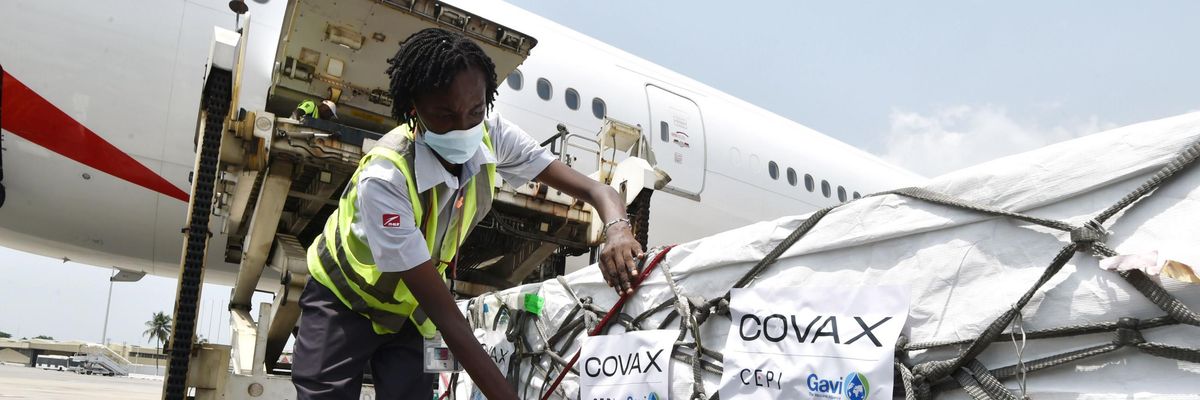While welcoming reports that U.S. President Joe Biden will commit to donating 500 million doses of the Pfizer-BioNTech Covid-19 vaccine to more than 100 countries over the coming year, activists and advocacy groups on Wednesday stressed that what the world truly needs is an urgent and ambitious plan to manufacture and distribute billions more doses of the life-saving inoculations.
Responding to reports in the New York Times, Washington Post, and other outlets that Biden plans to donate 200 million doses of the two-shot Pfizer vaccine this year and 300 million more units in 2022 via the World Health Organization-led COVAX initiative, groups including Doctors Without Borders (MSF), Public Citizen, and Oxfam urged the U.S. and other nations to go even further in the face of severe vaccine shortages in much of the Global South.
Peter Maybarduk, director of Public Citizen's Access to Medicines program, tweeted that next year is "a long time to wait for far too few doses."
"The world needs urgent new manufacturing to produce billions more doses within a year, not just commitments to buy the planned inadequate supply," Maybarduk said in a separate statement.
"We welcome this step from President Biden," he continued. "However, we have yet to see a plan from the U.S. government or the G7 of the needed ambition or urgency to make billions more doses and end the pandemic."
Niko Lusiani, Oxfam America's vaccine lead, said in a statement that "it's encouraging to see that in its quest to get America vaccinated, the Biden administration has not lost sight of the needs of those outside our borders."
"However, charity is not going win the war against the coronavirus," Lusiani asserted. "Surely, these 500 million vaccine doses are welcome as they will help more than 250 million people, but that's still a drop in the bucket compared to the need across the world."
Lusiani continued:
It's time to let the world help itself. Rather than more lucrative transactions with very profitable pharmaceutical corporations, we need a transformation toward more distributed vaccine manufacturing so that qualified producers worldwide can produce billions more low-cost doses on their own terms, without intellectual property constraints.
Ahead of the G7 Summit, Oxfam called on President Biden to rally other G7 leaders around temporarily waiving restrictive intellectual property rules, mandating companies share their technology with the World Health Organization, and investing in global, distributed manufacturing to ensure that everyone, everywhere will have access to a Covid vaccine.
In the face of international pressure, Biden surprised many observers last month when he announced his support for waiving patent protections for Covid-19 vaccines and treatments. The president's endorsement of a Trade-Related Aspects of Intellectual Property Rights (TRIPS) waiver at the World Trade Organization (WTO)--originally proffered by India and South Africa--prompted other nations to reconsider their opposition to the proposal.
"At the current rate of vaccinations, it would take low-income countries 57 years to reach the same level of protection as those in G7 countries." --Niko Lusiani, Oxfam America
Last month, China said it would support a TRIPS waiver "that is conducive to fair access to vaccines in developing countries." On Wednesday, Oxfam France executive director Cecile Duflot said French President Emmanuel Macron is now committed to supporting waiving vaccine patents. Also on Wednesday, the WTO announced during its TRIPS Council meeting that member nations would begin formal text-based negotiations on a temporary waiver of coronavirus-related patents next week.
However, nations including Germany, Japan, South Korea, Switzerland, and the United Kingdom remain opposed to a TRIPS waiver, as does the European Union. The pharmaceutical industry is also working to thwart the waiver.
Looking forward to the U.K.-led G7 leaders' summit set to begin on Friday, United Nations human rights experts on Wednesday called on leaders of the world's leading economies to ensure people in developing countries get equal access to Covid-19 vaccines and treatments.
"Billions of people in the Global South are being left behind. They see vaccines as a mirage or a privilege for the developed world," the experts said. "This situation will unnecessarily prolong the crisis, drastically increase the death toll, and deepen economic distress, possibly sowing the seeds of social unrest."
"It is shocking that, according to WHO reports, less than 1% of all vaccines administered so far have gone to low-income countries," they added.
Noting that "at the current rate of vaccinations, it would take low-income countries 57 years to reach the same level of protection as those in G7 countries," Oxfam's Lusiani said "that's not only morally wrong, it's self-defeating given the risk posed by coronavirus mutations."
As Covid-19 continues to exact a heavy toll in countries including India and Brazil, health advocates underscored the need for immediate action.
"Billions of people awaiting a path out of the pandemic desperately need President Biden and other world leaders to find far greater ambition," stressed Public Citizen's Maybarduk.




